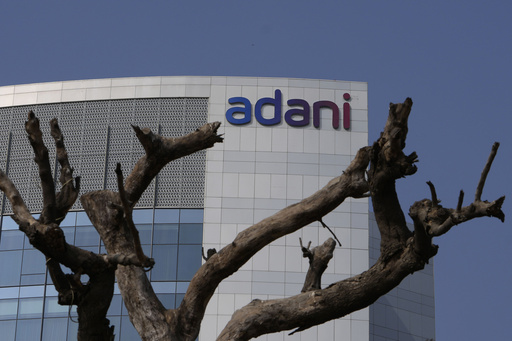NEW DELHI — Gautam Adani, a prominent Indian tycoon and one of Asia’s wealthiest individuals, is now facing significant challenges following an indictment by U.S. prosecutors for alleged fraud and bribery. The extent of how these developments will impact his businesses, personal future, and the broader Indian economy remains uncertain.
On Friday, the shares of Adani Group’s companies began to recover after experiencing a notable drop the previous day when the charges were made public in New York. By midday, most of his ten listed firms saw their stock prices rise between 1% and 4%.
Adani was charged with securities fraud and conspiracy to commit securities and wire fraud in a Brooklyn court. The 62-year-old founder has built a multibillion-dollar empire that spans various sectors, including energy, ports, media, and agriculture, and has been regarded as closely linked to Prime Minister Narendra Modi.
This new legal challenge emerges shortly after Adani and his business interests rebounded from an earlier crisis that saw him lose more than $60 billion in market capitalization in early 2023 due to allegations made by short-selling firm Hindenburg Research regarding stock price manipulation.
According to prosecutors, Adani misled investors in a significant solar project in India by hiding the fact that it was supported by bribery. Additionally, seven other executives within the Adani Group are also facing charges related to this case. The indictment claims that approximately $265 million in bribes were intended for Indian government officials.
The Adani Group has refuted the allegations against the executives of Adani Green Energy, calling them “baseless” and promising to pursue legal action. So far, none of the individuals charged in the U.S. have been taken into custody.
Michael Kugelman, the director of the South Asia Institute at the Wilson Center, remarked that this indictment significantly jeopardizes Adani’s efforts to rebuild his image following previous controversies. He stated that this latest development has abruptly reversed any recent gains in his reputation and business success.
Adani’s influence within the Indian economy is substantial. He holds the position of the largest operator of coal mines and is involved in infrastructure development, overseeing numerous ports and airports, while also employing tens of thousands of individuals. Despite his substantial investments in fossil fuels, he aims to become the leading figure in renewable energy by 2030.
His rapid ascent has been attributed to his alignment with the Modi administration’s priorities, which has led to investments in critical sectors such as renewable energy, agriculture, and defense. In the past, Adani had cultivated relationships with various ruling parties.
The ongoing controversy could place Modi’s government, known for its close ties with Adani, in a precarious position. Amit Malviya, head of the BJP’s IT department, asserted on X that the U.S. charges should be viewed as unproven allegations, a statement that many critics interpreted as an endorsement of the Adani Group.
In response to the developments, the opposition party has intensified demands for Adani’s arrest, accusing Modi—who has previously campaigned using an Adani jet—of shielding him. This scrutiny is expected to intensify as parliament reconvenes next week for its winter session.
The repercussions of the indictment have already been felt internationally, with Kenya’s president canceling multimillion-dollar contracts with the Adani Group for airport upgrades and energy initiatives. Additionally, scrutiny regarding Adani’s actions is anticipated in Bangladesh following a court-ordered investigation into an energy project.
Adani’s legal issues may also cast a shadow over India’s international relations, particularly in countries like Sri Lanka, where India aims to compete with China for vital market opportunities. Analysts highlight the unfortunate timing for New Delhi, noting that it coincides with efforts to attract businesses seeking alternatives to China for manufacturing locations.
Experts assert that while the situation poses business risks within India, the impact is likely to be localized, primarily threatening Adani’s reputation and operations rather than the broader market. Ambareesh Baliga, an independent market analyst, suggested there is no threat of financial contagion at this stage and noted that the fallout will mainly affect the Adani Group’s growth and fund-raising efforts.
Despite these challenges, many in India are not particularly shocked by the news. Business leaders and the public have a profound understanding that malpractices such as bribery are deeply entrenched in the Indian economy. Baliga concluded that while some investors might pause initially, they will likely return because the Adani Group is too significant to overlook in the long term.




